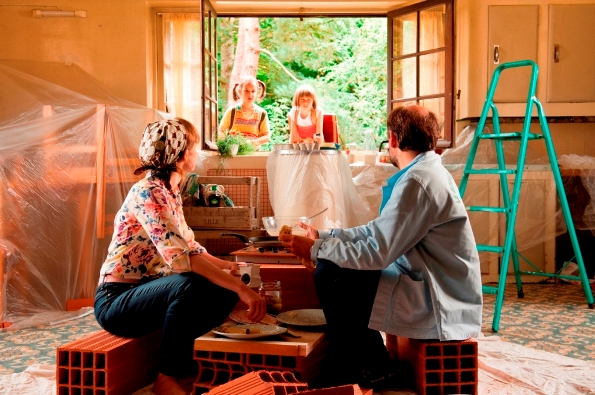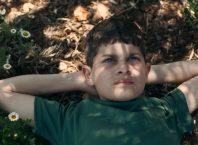Rachel is 9, and has the countenance of absolute gloom. She’s not looking forward to the start of the new school year; going to bed with her bag strapped to her back suggests as much. Mind you, the problems might lie as much at home as with the life exterior. She shares her bedroom with her grandmother, seemingly catatonic even though she was chucked out of her nursing home for…well, as she puts it, “I’m sure he had a heart complaint beforehand.” As for her parents? Michel Gladstein, her father, survived the Nazi death camps, and carries the complexion of eternal suffering about with him everywhere he goes. Well, he would, if wife Colette would let him. A typical family conversation:
Michel: Where were you during the war?
Colette: Tunis. You think you have a monopoly on suffering?

Du Vents Dans Mes Mollets, directed by Carine Tardieu and based on the novel by Raphaele Moussafir, is a bitter-sweet family drama propped up by the twin pillars of nostalgia and childhood. Films in this vein often have a rather horrid habit of subsiding into saccharine irrelevance or disconcerting hyper-verite. But this differs, ending up being rather charming despite neurotic tics, because the child principals feed the story with a subversive irreverence. It’s neither doom and gloom nor jolly japes and lashings of fun. Just a real slice of life experienced by a 9 year old.
It’s 1982, suburban France. Rachel (Juliette Gombert) does make a friend in her new class, the irrepressible Valerie (Anna Lemarchand). She is an extrovert where Rachel is diffident, daring where the other is circumspect. They are an odd couple, but bond over malice, prurience and suggestibility.
Not quite so their parents. Valerie’s mother, the free-spirited Catherine, lives in a rambling and untidy house with her two children. She is everything the Gladsteins are not; and it isn’t merely Rachel that is attracted to the freedom that their home offers. Michel drifts, despite himself, into Catherine’s orbit. With Colette glowering on the side (her mother, Rachel’s hitherto catatonic room-mate, doesn’t help things by proposing that daughter will have to start doing the old “hokey-pokey” once again to win her husband), the scene is set for an uneasy emotional menage-a-trois.
The Jewishness of the Gladsteins plays a principal, if understated role in the family dynamics and the relationship with their local community. When Michel is forced to report adulterous goings-on in his daughter’s school, the first thing he says is that “I don’t like to denounce others, but…”. Otherness often provides a rich mine for comedy, but what allows it to work so well in Du Vents Dans… is the fact that the audience are allowed to laugh with the Gladsteins rather than at the Gladsteins. It is a subtle line, but one that the film negotiates well.
There is a predictable arc to Du Vents Dans…but it doesn’t offend because there is enough distraction to keep the imagination happy. Agnes Jaoul, as ever, is excellent as Colette; Isabella Rossellini, as Rachel’s therapist, lends a calming presence to the neurotic chaos that is the 9 year old’s life. But the film, I’d say, belongs to the young Miss Gombert. Her wide eyed innocence makes everything around her seem very real indeed.
Du Vent Dans Mes Mollets (Dandelions) (2012, 89 min, French with Hebrew and English subtitles)
Directed by Carine Tardieu, starring: Agnes Jaoul, Denis Podalydes, Isabelle Carre, Juliette Gombert and Isabella Rossellini.





